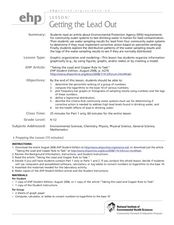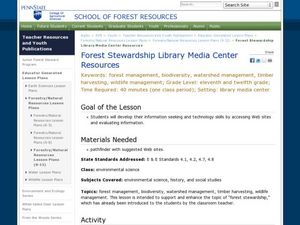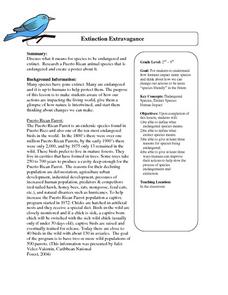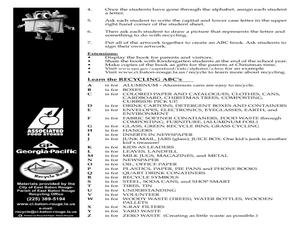Curated OER
Lesson: Living With the Farm Next Door
Discuss with learners why farms are growing in size and why there is sometimes conflict between farmers and their non-farming neighbors. Read the article, "Living With the Farm Next Door," and then craft letters to the editor from the...
Curated OER
Why Are The Shore Birds Dying?
Learners engage in a field study of birds and how they are in danger harm due to environmental factors. They list different possible causes in a prediction activity. The observations are done while writing up data and connecting it to a...
Curated OER
Science Fair With An Energy Efficiency Flair
In order to learn more about energy conservation, pupils work to promote energy efficiency by participating in a school-wide science fair with an emphasis on energy conservation. In addition to displaying their projects, learners invite...
Curated OER
Getting the Lead Out
The article for this instructional activity no longer accessible through the links in the lesson plan, but can be found in the National Center for Biotechnology Information website. After reading it, environmental science students answer...
Curated OER
Forest Stewardship Library Media Center Resources
Students develop their technology skills by accessing web sites and evaluating information. In this research instructional activity students research forestry topics and write a paragraph on the accessed websites.
Curated OER
Understanding the Indoor Environment
Students create and deliver speeches about why their school should have an Indoor Air Quality team. In this speeches lesson plan, students make presentations to school board members about having an IAQ team.
Curated OER
How Do People Change the Environment?
For this environmental changes worksheet, students will read statements about things people do. Then students will fill in the blank of 4 statements that describe the effect those actions have on changing the environment.
Curated OER
Extinction Extravagance
Students brainstorm and discuss what it means for a species to be considered endangered and/or extinct. They research animals in Puerto Rico and choose one that is considered endangered and create a poster about it. In addition, they...
Curated OER
Why Does Evolution Matter Now?
Students are shown why they should care about evolution. They become specialists in one sphere influenced by evolution and then share their findings with their group. Students are lead into a class discussion, so that each student can...
Curated OER
Human Impacts on Sharks: Developing an Essay Through Peer-Review on a Discussion Board
Students develop a paper topic (in this case, the human impacts on sharks) that is peer reviewed by additional students answering guided questions. The original student must respond to the comments by the fellow classmates. All of the...
Curated OER
Image Classification
Students explore what are "multi-spectral" or "multi-band" images? They investigate how landscapes change over time- at least over the time-span of satellite imagery, particulary due to human influences. Students explore how to train...
Curated OER
Changes in the Atmosphere or Hydrosphere
In this atmosphere and hydrosphere worksheet, students work on assigned topic which are either categorized as human activity or natural activity which impact the atmosphere and the hydrosphere. Students work in groups and answer...
Curated OER
Stanley Park and Aquarium Field Trip
Learners explore the beauty of British Columbia by participating in a class field trip. In this ecosystem observation lesson plan, students investigate the Vancouver Aquarium and Stanley Park, one of the largest parks in North America....
Curated OER
Types of Marine Debris
Students conduct an experiment. In this marine debris and environment protection lesson, students categorize trash into piles, predict whether these trash items will sink, float or be picked up and carried by the wind and then test...
Florida Department of Environmental Protection
Water's Journey Expedition
Step into a scientist's shoes to go online and discover the Florida Springs Expedition, and participate in two activities focusing on how humans impact the environment. The first activity asks scholars to summarize the six dispatches at...
Teach Engineering
Where Are the Plastics Near Me? (Field Trip)
With a piece of plastic here and a piece of plastic there, here a piece, there a piece, everywhere a piece. Teams go on a field trip in order to document the locations and kinds of plastic trash in an area near them. The eighth...
Population Connection
The Carbon Crunch
Carbon is in the air; should we care? Teach the class why it is important to pay attention to carbon levels and how the world population and various countries across the globe affect the carbon levels in the atmosphere. High schoolers...
Centers for Disease Control and Prevention
Understanding the Epidemiologic Triangle through Infectious Disease
Introduce infectious diseases and the epidemiologic triangle. A helpful resource describes the agent, host, and environment from the three vertices as well as the time factor, which is in the middle. Scholars complete a simple...
Teach Engineering
Where Are the Plastics Near Me? (Mapping the Data)
The last activity in a nine-part series has teams create a Google Earth map using the data they collected during a field trip. Using the map, groups analyze the results and make adjustments to the map to reflect their analysis. A short...
Curated OER
Global Warming
Four slides attempt to explain global warming. The first mentions that Earth's climate has experienced major changes throughout history, but that scientists believe humans are now changing it. The second explains why this is so. The...
Curated OER
Horseshoe Crab Fun
Marine biology masters will meet the horseshoe crab and red knot shore birds that feast upon the crab eggs. Begin with a discussion and then have learners write postcards from each animal detailing their migration trips. A few math...
Curated OER
Endangered Animals: Hawaii
Students locate regions in Hawaii where specific endangered animals live. They describe habitats, identify reasons why the species has become endangered, consider how a healthy environment for wildlife contributes to a healthy...
Curated OER
The Recycle Alphabet
First graders recognize words associated with recycling. In this environmental lesson, 1st graders go through the alphabet and think of words associated with recycling that start with a letter. Students create a recycling ABC book.
Curated OER
3D Textured Globe
The earth, our home planet, and the star of Earth Day celebrations everywhere! Celebrate Earth Day or examine Earth's place in the solar system, with a fun and easy craft, perfect for children nine and up. Paper mache ornaments, paint,...

























